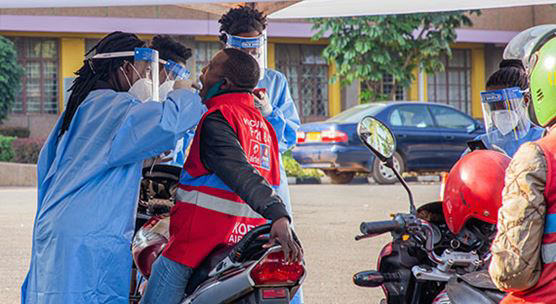Regional
Rwanda's handling of COVID 19 Pandemic commendable

Moto-taxi riders being tested for COVID-19 on a street in Kigali
While
European countries such as France and Germany are bracing for a third wave of
COVID-19 cases, Rwanda is steadily edging towards making life as normal as
possible for its citizens.
Rwanda
identified the first case of the new Corona virus on its territory on March 8,
2020. The patient had symptoms upon arrival in Rwanda and reported himself to a
health facility. The country immediately adopted stringent measures, including
closing all schools, pubs, restaurants, places for worship, and instituted a complete
lockdown of the capital. In addition, it initially imposed a night curfew from
21:00 hrs to 4:00 a.m.
The
Rwandan government followed the advice of the World Health Organisation (WHO)
on how to prevent COVID-19 from spreading by advising the population to adopt
simple day-to-day measures that include regular hand washing with soap and
water, using sanitisers, testing people
for high temperature at the entrance of all venues including markets, shops,
banks, hotels, and others.
Rwanda
also deployed an army of volunteers to remind people to wear a mask and wear it
properly. It deployed the police to ensure observance of the preventive
measures.
The
first lockdown was understandably very painful to casual workers especially
residents of the capital who so much depended on hand-to-mouth jobs. But the
government quickly rolled out a program to supply food and basic essentials to
assist the most in need in the community.
Other measures included screening for COVID-19 for any arrivals at the country's main airport using health officials and modern technology, including robots. The mandatory 24-hour quarantine helped to control infection rates. Anyone departing from Rwanda had to show a negative COVID-19 test certificate obtained within 72 hours.
Robots deployed at the airport and hospitals
boosted Rwanda’s response to COVID-19
These
measures could not have been successful without a vigilant and responsible
government which acted quickly to impose measures to bring under control the
pandemic whenever there was an uptake in cases. This was the case most recently
when the government imposed another lockdown and put a halt to movements
between the capital and the provinces.
Last
October, the WHO applauded Rwanda for instituting a strong system that enabled
the country to effectively confront the pandemic.
Rwanda
continues to run an all-of-government response to bring the virus under
control, following the fundamentals from testing and contact tracing to wide
use of public health measures.
Rwanda put in place a robust system of tracking and tracing, isolating and treating COVID-19 patients. In a very short time, the government opened a specialized hospital in the capital, Kigali, to deal specifically with the isolation and treatment of patients. The hospital has more tha 130 beds.
Aerial view of new Nyarugenge hospital providing
intensive care for COVID-19 patients
As
of March 25, Rwanda had registered 21,210 COVID-19 confirmed cases, out of
which 19,540 had already recovered. The death toll from the virus stood at 298.
The district with the highest number of infected people is Gasabo (in Kigali
city) with 23 cases.
The
country recently detected 12 cases of the UK variant from people travelling to
Rwanda. They were quickly isolated and treated.
Medical
teams carry out COVID-19 testing on a daily basis at the airport and border
points, and in all parts of the country.
The results are made public on every day. The tests are also done free
of charge. People arriving in the country
are tested and receive their results in less than 12 hours.
Nevertheless,
in February, despite these achievements in containing the pandemic, Britain put
Rwanda on the list of high-risk countries banning all flights from Rwanda. Its
travel bans were extended to the United Arab Emirates, Burundi and Rwanda.
Rwanda protested this irrational measure, and asked for an explanation but no
response was received.
Surprisingly,
earlier, the Lowy Institute, a think-tank based in Australia, had ranked Rwanda
sixth - and the only African country in the top 10 - among the countries that handled
the outbreak best. Its COVID Performance Index found that, among other factors,
capable institutions were the most important factors in managing the pandemic.
However,
Britain soon removed Portugal and Mauritius from its travel ban list without any
scientific explanation, begging the question: was the travel ban which affected
Rwanda, and left its neighbors out a political gimmick?
The
country's fight against the pandemic got a short in the arm with the arrival,
on March 3, of the first shipment of COVID-19 vaccines through the COVAX initiative. According to the WHO, the first batch of 240,000 of
Astra-Zeneca-Oxford vaccines arrived in Kigali, followed another one of Pfizer.
Rwanda immediately rolled out its vaccination programme starting with persons
of high risks; frontline workers like doctors and nurses, teachers,
journalists, and those who interact with many people in their daily activities
like business people, taxi and minibus
drivers, moto taxi riders, as well as street cleaners.
More
than 343,700 people received their first dose and there are no cases of serious
side effects registered like blood clotting as was reported in some European
countries.

